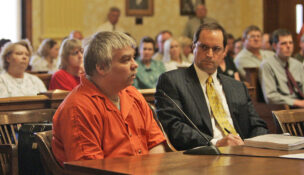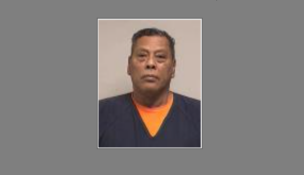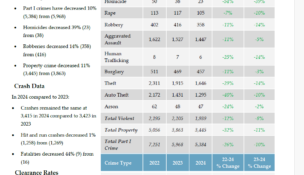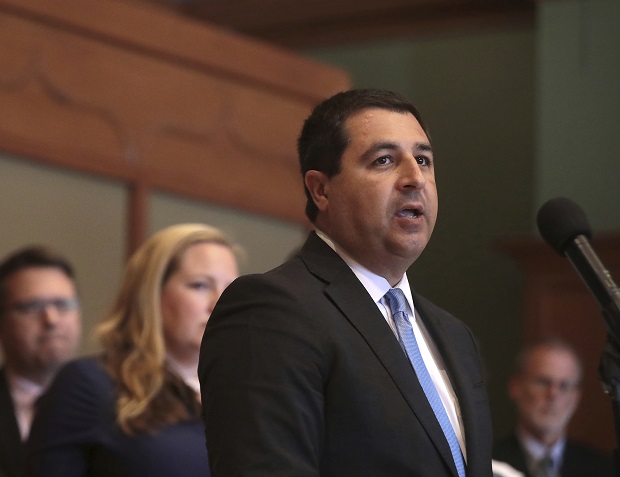Gramling has enjoyed teaching from the bench
By: dmc-admin//April 16, 2007//
 |
| “One thing I’ve learned as a municipal court judge is the enormous power that the driver’s license bears.”
James A. Gramling, Jr., |
Milwaukee Municipal Court Judge James A. Gramling Jr. says that at first, he really didn’t like the lack of windows in his courtroom or chambers. But with time, he got used to it.
It quickly comes across from talking to Gramling that, during the more than two decades that he has been on the bench, he has not let those thick walls shield him from the vibrant city that is his jurisdiction.
Gramling will retire on April 30, now that the city’s voters have chosen his successor.
Phil Chavez narrowly defeated Jen-nifer Havas in the April 3 election, garnering 51 percent of the vote to Havas’ 49 percent.
Teaching Students
It was a cloudy Thursday morning a few weeks ago, when 14 students from Pulaski High School visited Gramling’s court. For one half-day, the students job-shadowed him and a number of other court system employees — his staff, the city attorney, social services personnel, etc. — while Gramling handled the usual busy calendar of arraignments.
Before the litigants arrived, Gramling and the students had a lively discussion about the U.S. Constitution, at 8:10 a.m. no less. He’s a morning person.
To the students’ surprise, they learned that they may “plead the Fifth” in municipal court while testifying, and their assertion of that right out on the street sometimes results in an “obstructing an officer” charge in municipal court. They also learned that municipal judges often address questions of individual rights, in particular, the right to be free from unreasonable searches under the Fourth Amendment. They came to see that they need to know about the Constitution not just because there will be a test, but because it really does affect their lives.
The goals were to learn about what goes on in municipal court; to possibly pique the interest of those who might be considering careers in the justice system; and to remind the young adults of their roles and responsibilities as citizens of the community.
This was the second time last month that Gramling hosted a group of Pulsaki High students. He explains that he and his two colleagues, Judges Valarie A. Hill and Derek C. Mosley, have become liaisons of sorts to designated Milwaukee high schools (his is Pulaski).
Watching Gramling interact with the students, it is clear that he is enjoying himself, and that the students are interested in what he has to say.
Teaching is one of his passions. Gramling is a frequent presenter at judicial education programs for other municipal judges, and notes that, as one of only four full-time municipal judges in the state, it’s to be expected that he encounters situations and legal issues that most of his colleagues do not. Helping them can be very gratifying, he says.
Pro Se Litigants
As a municipal court judge, roughly 95 percent of the litigants before him are pro se (but please don’t call it “The People’s Court”). Gramling frequently finds himself educating one or both parties about the law.
He doesn’t find it tedious at all, but rather, rewarding to see someone understanding what’s going on and leaving satisfied that he or she was heard and dealt with in a just and respectful manner.
So, it shouldn’t come as too great a surprise that, with Gramling’s upcoming retirement, among his plans are to teach and write. He’s not entirely certain where or whom he’ll be teaching; “But I’m sure I’ll be able to cobble something together,” he says optimistically.
That will be in between volunteer shifts at a new collaborative effort between the city and the private sector that will strive to help individuals get their driving privileges restored.
“One thing I’ve learned as a municipal court judge is the enormous power that the driver’s license bears,” he says. “When someone can’t drive, they cannot drive to work, and chances are, then they’re not driving to work and supporting themselves or their families. And when they apply for jobs, employers often ask applicants if they have a driver’s license. If they don’t, rightly or wrongly, the employers often take that as some sort of measure of their character: ‘If they don’t have a driver’s license, they must have gotten into trouble, and I probably shouldn’t hire them.’”
In fact, on this very same morning, Gramling had stopped by the MATC cafeteria across from the courthouse very early to pick up a salad for his lunch. While there, he ran into a former litigant/MATC student who proudly showed him his driver’s license and thanked him for his help in its reinstatement.
He offered to buy Gramling’s salad. For the record, Gramling declined.
Milwaukee Changes
Gramling has kept a close eye on what’s happening within his hometown over the years.
Among the more troubling trends he has noticed is that Milwaukee’s poor seem to have become poorer over the years. There’s a diminished emphasis upon education, and that has spilled into employment. Jobs are much more plentiful for those with skills and education, but there are fewer qualified candidates. Many struggle with frequent unemployment or with dead-end, low-paying jobs. Many eventually find themselves in the justice system, either as defendants or crime victims.
At the same time, children do not seem to be valued as much as they were in bygone years, he noted. The truants and curfew violators that Gramling encounters in his courtroom don’t seem to have any support and guidance from caregivers, and as a result, they seem completely unprepared for the adult world they’re going to enter in a few years.
On one hand, the role of a municipal court judge isn’t to fix those deep social problems. At the other extreme, the judge’s role isn’t to ignore problems and just raise revenue for a city, either. Gramling says his role is to administer justice while helping those individuals whenever possible and appropriate. The driver’s license initiative is one way to do that.
“We’ve never felt pressured here from the Common Council or Mayor’s Office to raise money through fines,” he says. “I think they view us as a local court, responsible for helping to meet local needs.”
He continues, “We’ve always enjoyed strong support from the city. We haven’t had to face the budgetary issues like they have at the circuit courts, thankfully, although we’ve had to deal with cuts like just about every arm of government has in recent years. The city has always adequately staffed us; no one’s doing their own janitorial work. And not only have we managed to keep up with technology, but I think what we have surpasses what’s available in the state court system.”
Law School
Gramling says he opted for law school not because he had desires to try high-profile, high-stakes cases or to make big changes in the world, but rather, to help the poor and unempowered in small ways — yet they would be ways that would be hugely significant to them.
He took every poverty law-related course available at the University of Wisconsin, when poverty law was just starting to emerge as an area of practice. Upon his graduation in 1971, he became a legal services lawyer for 15 years, first in Kansas City, MO and then at Milwaukee’s Legal Action of Wisconsin.
He then learned of an upcoming vacancy on the municipal court. He won in the special election that was held to fill it, and took the bench on April 10, 1986.
The change in roles was a comfortable transition for him. “I soon found out that this is the kind of court that touches a lot of the lives of the same people I’d always represented — people whose poverty and/or lack of understanding of the law has caused them to become enmeshed in legal problems.”
Gramling has seen many colleagues use the municipal court bench as a stepping-stone of sorts to other jobs on the bench. They include Justice Louis Butler, Jr. and Judges Ted E. Wedemeyer Jr. and Rudolph Randa.
“For a while when I first started here, I thought maybe I’d do that, too, but it soon became apparent to me that this was the place for me,” he says.
Legal News
- Steven Avery prosecutor Ken Kratz admits ‘mistakes were made’
- Colombian national extradited to Milwaukee faces International narcotics-trafficking conspiracy charge
- MPD: Milwaukee homicides down nearly 40 percent compared to last year
- EVERS: Republican lawmakers No-Show at special meeting to release statewide PFAS funding, stabilize healthcare access
- Wisconsin ICAC Task Force conference on Missing and Exploited Children highlights increase in sextortion cases
- More than 300 Wisconsin officers back in law enforcement after being fired or forced out
- Former Trump staffer who said to ‘fan the flame’ after 2020 loss hired to lead Wisconsin GOP
- Gov. Evers appoints David Casey to Serve as DOR Secretary
- Former Marine sentenced for Molotov Cocktail attack against Planned Parenthood Clinic
- ABA names 34th Annual Margaret Brent Women Lawyers of Achievement Awards honorees
- FBI launches criminal investigation into Key Bridge collapse
- Man charged in slaying after woman’s leg found at Milwaukee-area park
WLJ People
- Power 30 Personal Injury Attorneys – Russell Nicolet
- Power 30 Personal Injury Attorneys – Benjamin Nicolet
- Power 30 Personal Injury Attorneys – Dustin T. Woehl
- Power 30 Personal Injury Attorneys – Katherine Metzger
- Power 30 Personal Injury Attorneys – Joseph Ryan
- Power 30 Personal Injury Attorneys – James M. Ryan
- Power 30 Personal Injury Attorneys – Dana Wachs
- Power 30 Personal Injury Attorneys – Mark L. Thomsen
- Power 30 Personal Injury Attorneys – Matthew Lein
- Power 30 Personal Injury Attorneys – Jeffrey A. Pitman
- Power 30 Personal Injury Attorneys – William Pemberton
- Power 30 Personal Injury Attorneys – Howard S. Sicula











